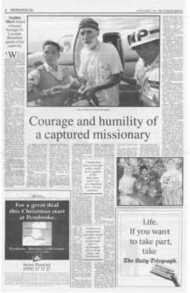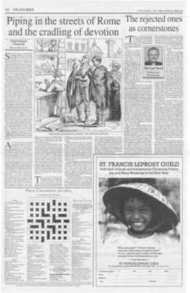Page 8, 4th December 1998
Page 8

Report an error
Noticed an error on this page?If you've noticed an error in this article please click here to report it.
Tags
Share
Related articles
Now No One In Britain Can Ignore Religion
In Future Our Cardinals May Have Polish Names
Optimism Of A Catholic Bookseller
Time For A Counter Attack
Today's Disquieting Elizabethan Echoes
English is ory's Catholic future
DAVID TWISTON DAVIES
IAM YOUNG ENOUGH to hope, with some confidence. that I shall live to see publication of a new Catholic History of England which will command general acceptance. It will build on previous efforts by Charles Dodd in the 18th century, John Lingard in the 19th and Hilaire Belloc in the early part of this century. though Belloc's sweeping approach was open to justified criticism. But in the last 60 years, Catholics have concentrated on showing how their community kept the faith and survived. They have included Bishop David Matthew, whose Catholicism in England was written before the Second World War and Professor John Bossy and John Aveling who produced two excellent volumes in the mid-1970s.
These historians laboured under the knowledge that they could not shake the Protestant belief in the rightness of the Reformation and the Glorious Revolution. In recent years, however, the Catholic view of these events has won remarkable, respect as legitimate interpretations, thanks to two books. Eamorin Duffy's Stripping of the Altars was based on detailed research of parish records. Building on work by such contemporaries as Professor Jack Scarisbrick, Duffy has irreparably holed the idea that the Reformation gave the Church a badly needed fresh start.
Eveline Cruilcshanks's first book, Political Untouchables: the Tories and' the '45, was received in almost total silence by her fellow 18th-century historians. Yet its account of the widespread, secret sympathy for the exiled Stuarts has given birth to a s.chool of vigorous scholars . This has destroyed the assumption (shared by many Catholics) that Jacobitism 'vas a hopeless romantic dream of a tiny minority. Instead, it has shown that many Ang licans did not consider their rightful sovereign's Catholicism a bar to his succession.
To be successful, a new history will need to do more than put right traditional misconceptions_ An historian with the necesgary judgment and professionaal skills will need to consider the decline in anti-Catholic prejudice, signalled by the repeal of the penal laws betwseen the 1780s and the 1920s. and the increasing identificatio n of Catholics as true Englishmen. Such recognition was enhanced by the number of Catholics who clied in action during the two asvorld wars — as attested by th c photographs of so many that c an be seen on the walls of our public schools — and confirmed by the visit of Pope John-Paul II, the Cold War warrior, in 1982. The historian must also consider why Few Catholics have made their mark in politics since the bar imposed on the office of Lard Chancellor was removed in the 1970s. Should this be attributed to a latent fear of Preotestant prejudice or just the decline of religious practice iri the nation as a whole?
Since the watershed of the Second Vatican Council, which did much to encourage the Catholic community to abandon the ghetto outlook, Catholics have demonstrated oneness with the ir countrymen by increasingly declining to go to church. Yet while tile Anglican Church has see tried to grow ever more unsure of itself as it has sought to hope "relevant", Catholics have been increas ingly drawn to the forefront of debate over social, ethical and medical issues.
Why a Catho-lic history of England, not Eiritain? The answer is that religion has remained one o f the greatest distinctions between the four nations of the United Kingdom.
Unless we understand these constituent parts, we cannot hope to identify the whole, however that mi_ght be identified after the in_troduction of devolution.
blog comments powered by Disqus













